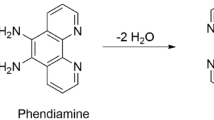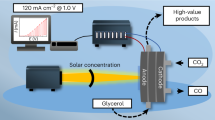Abstract
PHOTODECOMPOSITION of water using semiconducting electrodes is being widely investigated. Using a combination of theoretical methods and experimental results we have analysed the sequential processes involved in this (phenomenon and show here that several steps are irreversible. Some of the consequences of these irreversibilities are discussed. A theory of electronic charge transfer between electrodes and aqueous electrolytes, based on an equilibrium approximation by Marcus1, seems to be valid for metal electrodes. Gerischer2 has considered both metal and semiconductor electrodes and concluded that in general the electron is isoenergetically injected (tunnels) from the occupied band state of the electrode into an unoccupied state of the electrolyte. Rearrangement of the molecular environment then occurs, irreversibly changing the energy of the electronic state of the electrolyte. Finally, reverse tunnelling from the relaxed state back into the electrode may occur.
This is a preview of subscription content, access via your institution
Access options
Subscribe to this journal
Receive 51 print issues and online access
$199.00 per year
only $3.90 per issue
Buy this article
- Purchase on Springer Link
- Instant access to full article PDF
Prices may be subject to local taxes which are calculated during checkout
Similar content being viewed by others
References
Marcus, R. A. J. chem. Phys. 24, 966–978 (1956); 38, 1858–1862 (1963).
Gerischer, H. Adv. Electrochem. electrochem. Engng 1, 138–232 (1961).
Gerischer, H. J. electronal. Chem. 82, 133–143 (1977).
Honda, K. & Fujishima, A. Nature 238, 37–38 (1972).
Nozik, A. J. Nature 257, 383–386 (1975).
Wrighton, M. S., Ginley, D. S., Wolczanski, P. T., Ellis, A. B., Morse, D. L. & Linz, A. Proc. natn. Acad. Sci. U.S.A. 72, 1518–1522 (1975).
Mavroides, J.G., Tchernev, D. I., Kafalas, J. A. & Kolesar, D. F. Mater. Res. Bull. 10, 1023–1030 (1p75).
Nozik, A. J. Appl. phys. Lett. 30, 567–569 (1977).
Morrison, S. R. & Freund, T. Electrochim. Acta 13, 1343–1349 (1968).
Nozik, A. J. Appl. phys. Lett. 29, 150–153 (1976).
Williams, F., Varma, S. & Hillenius, S. J. chem. Phys. 64, 1549–1554 (1976).
Henglein, A. Ber. Bunsen-Gesellschaft Phys. Chem. 78, 1078–1984 (1974).
Myamlin, V. A. & Pleskov, Y. V. Electrochemistry of Semi-conductors 171 (Plenum, New York, 1967).
Landau, L. D. & Lifschitz, E. M. Quantum Mechanics 61–62, 174–175 (Pergamon, London, 1958).
Pankove, J. I. Optical Processes in Semiconductors 111 (Prentice-Hall, Englewood Cliffs, 1971).
Eisenberg, D. & Kauxmann, W. Structure and Properties of Water 207 (Oxford University Press, Oxford, 1969).
Author information
Authors and Affiliations
Rights and permissions
About this article
Cite this article
WILLIAMS, F., NOZIK, A. Irreversibilities in the mechanism of photoelectrolysis. Nature 271, 137–139 (1978). https://doi.org/10.1038/271137b0
Received:
Accepted:
Issue Date:
DOI: https://doi.org/10.1038/271137b0
This article is cited by
-
Utilizing hot electrons
Nature Energy (2018)
-
Solid-state perspectives of the photoelectrochemistry of semiconductor–electrolyte junctions
Nature (1984)
Comments
By submitting a comment you agree to abide by our Terms and Community Guidelines. If you find something abusive or that does not comply with our terms or guidelines please flag it as inappropriate.



